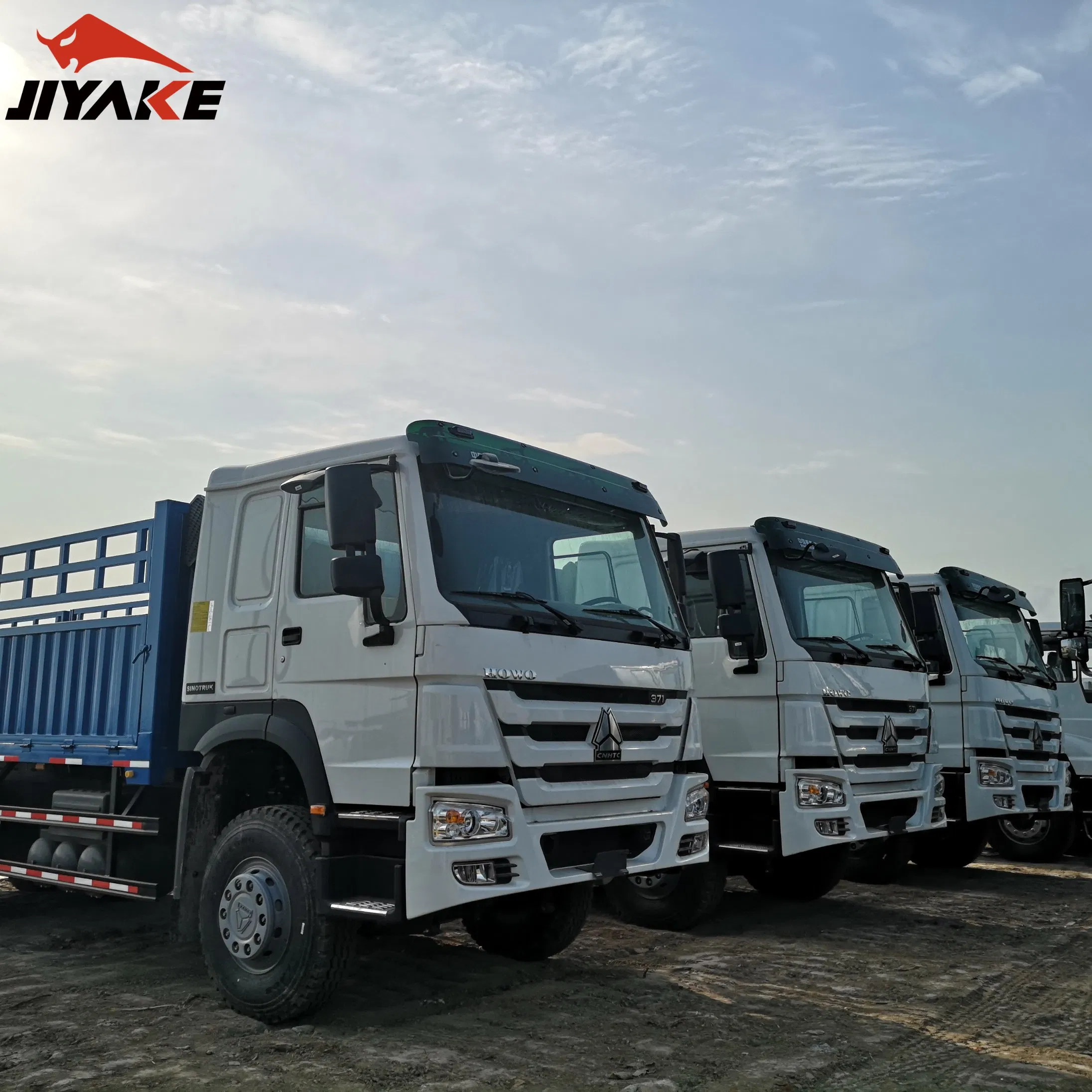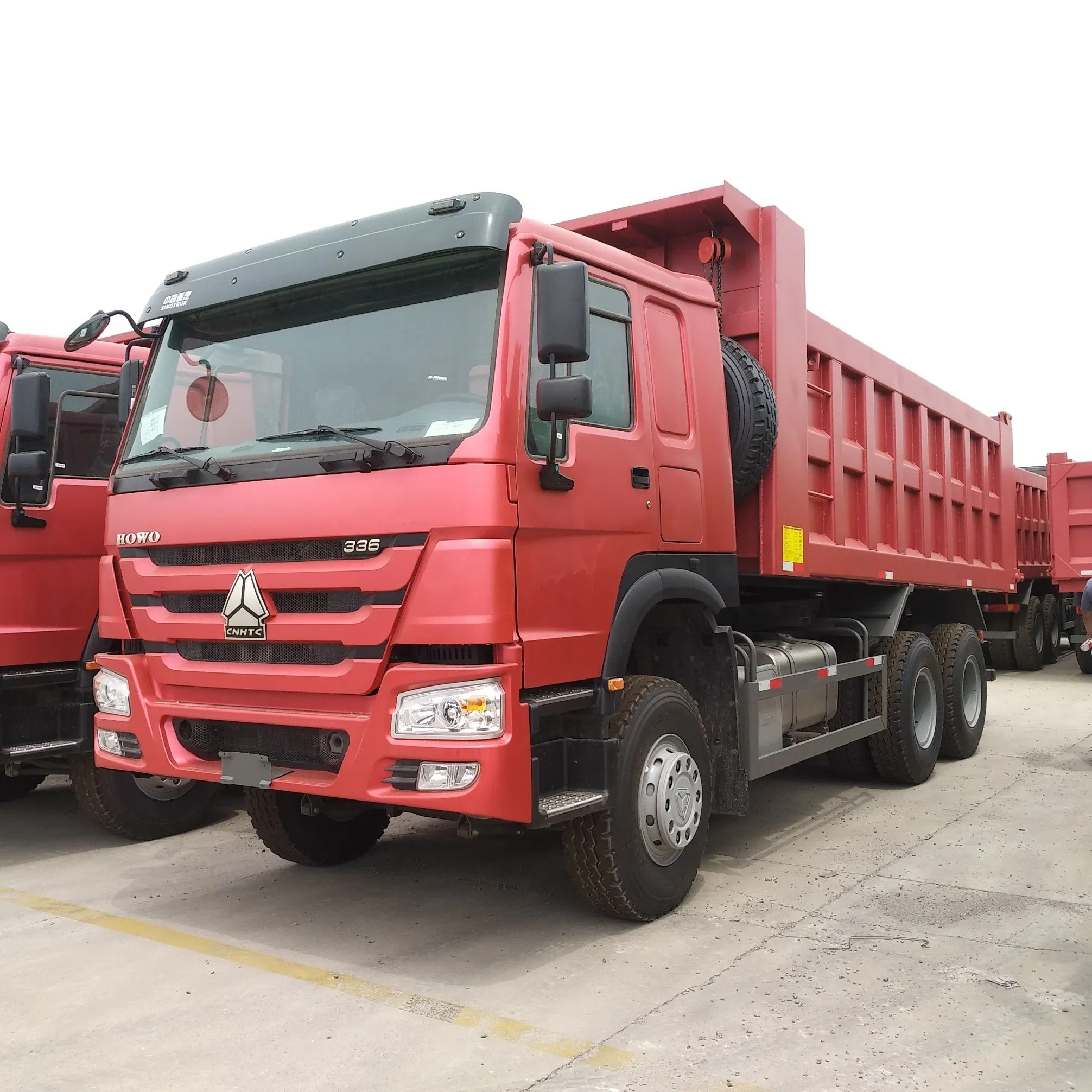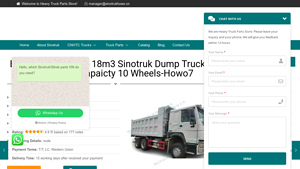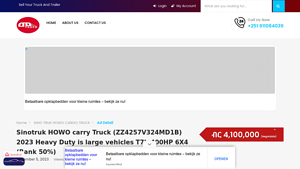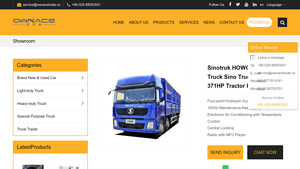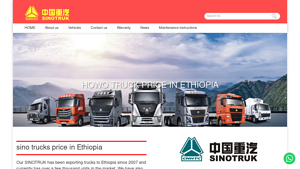Introduction: Navigating the Global Market for sinotruck Howo Ethiopia
Navigating the complexities of sourcing Sinotruk Howo vehicles in Ethiopia presents a significant challenge for international B2B buyers. As businesses in Africa, South America, the Middle East, and Europe seek reliable and efficient transportation solutions, understanding the local market dynamics and supplier landscape is crucial. This guide aims to equip you with actionable insights into the diverse range of Sinotruk Howo models available in Ethiopia, including dump trucks, heavy-duty trucks, and specialized vehicles tailored for various applications.
Within this comprehensive resource, we will delve into essential topics such as identifying reputable suppliers, evaluating cost structures, and understanding the specific requirements for different industries. By providing a detailed overview of pricing trends, product specifications, and market conditions, this guide empowers you to make informed purchasing decisions that align with your operational needs.
Furthermore, we will highlight key considerations for B2B buyers, including logistics, warranty options, and after-sales support, ensuring that you can confidently navigate the intricacies of the Ethiopian market. Whether you’re based in Nigeria, Saudi Arabia, or elsewhere, this guide serves as your strategic partner in securing quality Sinotruk Howo vehicles that drive your business forward.
Understanding sinotruck Howo Ethiopia Types and Variations
| Type Name | Key Distinguishing Features | Primary B2B Applications | Brief Pros & Cons for Buyers |
|---|---|---|---|
| Howo Dump Truck | 6×4 and 8×4 configurations, various horsepower options (266hp to 420hp) | Construction, mining, waste management | Pros: High payload capacity, versatile; Cons: Maintenance costs can vary. |
| Howo Tractor Unit | Heavy-duty tractor with 6×4 drive, suitable for long-distance haulage | Freight transport, logistics | Pros: Fuel-efficient, durable; Cons: Initial investment can be high. |
| Howo Cargo Truck | Available in multiple configurations (4×2, 6×4), optimized for city deliveries | Urban logistics, distribution | Pros: Good maneuverability, customizable; Cons: Payload may be limited compared to larger trucks. |
| Howo Mixer Truck | Specifically designed for transporting concrete, equipped with rotating drum | Construction, infrastructure projects | Pros: Efficient for concrete delivery; Cons: Requires careful maintenance of the mixing mechanism. |
| Howo Tank Truck | Designed for liquid transport, available in varying capacities | Fuel transport, water supply | Pros: Safe for hazardous materials; Cons: Regulations on liquid transport can complicate operations. |
What Are the Key Characteristics of Howo Dump Trucks?
Howo Dump Trucks are characterized by their robust build and high payload capacities, with configurations including 6×4 and 8×4 drive systems. They typically offer horsepower options ranging from 266hp to 420hp, making them suitable for heavy-duty applications in construction and mining. Buyers should consider the varying maintenance costs associated with these trucks, as they can influence the total cost of ownership.
How Do Howo Tractor Units Stand Out in Freight Transport?
Howo Tractor Units are designed for long-distance haulage, featuring a heavy-duty 6×4 drive system that enhances stability and fuel efficiency. These units are particularly favored in the logistics sector for their durability and ability to handle diverse cargo types. While the initial investment may be significant, the long-term savings on fuel and maintenance can make them a wise choice for businesses focused on transportation efficiency.
What Advantages Do Howo Cargo Trucks Offer for Urban Logistics?
Howo Cargo Trucks come in various configurations, including 4×2 and 6×4, making them highly adaptable for urban logistics and distribution tasks. Their design allows for good maneuverability in crowded city environments, and they can be customized to meet specific delivery needs. However, potential buyers should be aware that the payload capacity may be less than that of larger trucks, which could limit their utility for some heavy transport applications.
Why Are Howo Mixer Trucks Essential for Construction Projects?
Howo Mixer Trucks are uniquely designed for the transportation of concrete, featuring a rotating drum that ensures the mixture remains homogenous during transit. This type of truck is essential for construction and infrastructure projects where timely concrete delivery is crucial. Buyers must consider the maintenance of the mixing mechanism to ensure optimal performance, as any downtime can delay project timelines.
What Should Buyers Know About Howo Tank Trucks for Liquid Transport?
Howo Tank Trucks are specialized vehicles designed for the safe transport of liquids, including fuel and water. They come in various capacities and are equipped with safety features to handle hazardous materials. While they offer significant advantages in terms of safety and efficiency, buyers must navigate complex regulations governing liquid transport, which can add layers of compliance and operational challenges.
Key Industrial Applications of sinotruck Howo Ethiopia
| Industry/Sector | Specific Application of sinotruck Howo Ethiopia | Value/Benefit for the Business | Key Sourcing Considerations for this Application |
|---|---|---|---|
| Construction | Dump Trucks for Material Transportation | Efficient transport of heavy materials, reducing project timelines | Assess load capacity, engine power, and durability for rough terrains |
| Mining | Heavy-Duty Mining Trucks | High payload capacity for transporting minerals, enhancing operational efficiency | Evaluate reliability, service availability, and fuel consumption |
| Agriculture | Tank Trucks for Irrigation and Fertilizer | Effective delivery of water and fertilizers, promoting crop yield | Check for tank capacity and compatibility with local farming practices |
| Logistics and Distribution | Cargo Trucks for Freight Transport | Streamlined logistics operations, reducing delivery times | Consider vehicle size, fuel efficiency, and route adaptability |
| Waste Management | Garbage Compactors for Municipal Services | Enhanced waste collection efficiency, promoting cleaner urban environments | Ensure compliance with local regulations and waste volume capacity |
How is Sinotruk Howo Ethiopia Used in Construction?
In the construction industry, Sinotruk Howo dump trucks are vital for transporting heavy materials such as gravel, sand, and concrete. These vehicles are designed to handle rough terrains, making them suitable for various construction sites. By utilizing Howo trucks, construction companies can significantly reduce project timelines and improve overall efficiency. When sourcing these trucks, buyers should consider factors such as load capacity and engine power to ensure optimal performance in demanding conditions.
What Role Does Sinotruk Howo Play in Mining Operations?
Mining operations benefit greatly from Sinotruk Howo’s heavy-duty trucks, specifically designed for transporting large volumes of minerals and ores. These trucks offer high payload capacities, which enhance the efficiency of material handling and transportation. For international buyers, especially from regions rich in mineral resources, reliability and fuel consumption are critical factors to evaluate when sourcing these trucks, ensuring they meet the rigorous demands of mining activities.
How Can Sinotruk Howo Enhance Agricultural Efficiency?
In agriculture, Sinotruk Howo tank trucks are essential for the effective delivery of water and fertilizers. These trucks support irrigation systems and ensure timely application of nutrients, which are crucial for maximizing crop yields. For buyers in agricultural sectors, it is important to assess the tank capacity and compatibility with local farming practices to ensure that the trucks meet specific agricultural needs.
What Advantages Do Sinotruk Howo Trucks Offer in Logistics and Distribution?
Sinotruk Howo cargo trucks serve a pivotal role in logistics and distribution by facilitating the efficient transport of goods across various distances. Their design allows for streamlined operations, leading to reduced delivery times and improved supply chain efficiency. Buyers should focus on vehicle size, fuel efficiency, and adaptability to different routes when sourcing these trucks to meet their logistical requirements.
How Are Sinotruk Howo Vehicles Used in Waste Management?
In the waste management sector, Sinotruk Howo garbage compactors are utilized for efficient urban waste collection. These vehicles enhance the capacity for waste collection, contributing to cleaner cities and improved public health. Buyers should ensure that the trucks comply with local regulations regarding waste disposal and assess their capacity to handle the expected volume of waste.
3 Common User Pain Points for ‘sinotruck Howo Ethiopia’ & Their Solutions
Scenario 1: Difficulty in Finding Reliable Suppliers for Sinotruk Howo Trucks in Ethiopia
The Problem: International B2B buyers often encounter challenges when sourcing reliable suppliers for Sinotruk Howo trucks in Ethiopia. Issues such as inconsistent product quality, lack of transparency in pricing, and limited options for after-sales support can create uncertainty. This is particularly acute for companies looking to make significant investments, as they need assurance that they are purchasing vehicles that meet their operational requirements and are backed by dependable service.
The Solution: To overcome this challenge, buyers should conduct thorough research on potential suppliers. Start by leveraging online platforms that aggregate listings of Sinotruk Howo trucks, such as Jiji.com.et or Sino Heavy Vehicles. Pay close attention to supplier reviews, ratings, and transaction histories. Additionally, it is advisable to visit suppliers in person if possible or schedule video calls to discuss product specifications and service offerings. Building a relationship with suppliers can facilitate better communication and transparency. Establishing clear terms regarding warranties, service agreements, and pricing structures upfront can further mitigate risks associated with supplier reliability.
Scenario 2: Concerns Over the Maintenance and Durability of Sinotruk Howo Trucks
The Problem: Buyers often worry about the long-term maintenance and durability of Sinotruk Howo trucks, especially in demanding operational environments found in various regions of Africa and the Middle East. Questions about the availability of spare parts, the frequency of required maintenance, and the overall lifespan of the vehicles can deter potential purchasers. This concern is compounded by the fact that buyers may have had negative experiences with other truck brands in the past.
The Solution: To address these concerns, buyers should prioritize sourcing trucks from authorized dealers or reputable suppliers who can guarantee genuine parts and service. Research the specific model and its maintenance requirements through manufacturer resources or industry reviews. Additionally, consider joining local or regional transport associations that can provide insights into the performance of Sinotruk Howo trucks in your area. Establishing a partnership with a reliable mechanic or service provider familiar with Sinotruk vehicles can also ensure that maintenance is performed efficiently and correctly, thus extending the lifespan of the trucks.
Scenario 3: Navigating Complex Import Regulations and Costs for Sinotruk Howo Trucks
The Problem: Importing Sinotruk Howo trucks can present a maze of regulatory hurdles, tariffs, and unexpected costs. International buyers, particularly those new to the Ethiopian market, may struggle with understanding the legal requirements for vehicle importation, leading to potential delays and financial losses. This complexity can be particularly daunting for businesses aiming to scale operations quickly.
The Solution: To navigate this challenge effectively, buyers should engage with a local logistics or import consultant who specializes in vehicle imports. These professionals can provide insights into the specific regulations that apply, including necessary documentation, import duties, and compliance standards. Additionally, staying informed about any changes in trade policies or tariffs can help buyers budget effectively. It’s also beneficial to factor in all potential costs during the budgeting phase, including transportation, customs clearance, and registration fees. Establishing a timeline for the import process with the consultant can help manage expectations and ensure smoother operations.
By proactively addressing these common pain points, B2B buyers can make informed decisions when sourcing Sinotruk Howo trucks in Ethiopia, thereby enhancing their operational efficiency and achieving better returns on investment.
Strategic Material Selection Guide for sinotruck Howo Ethiopia
What Are the Key Materials Used in Sinotruk Howo Trucks for the Ethiopian Market?
When considering the strategic material selection for Sinotruk Howo trucks in Ethiopia, it’s essential to analyze the most common materials used in their construction. These materials significantly influence the performance, durability, and overall cost-effectiveness of the trucks. Below, we explore four prevalent materials: steel, aluminum, rubber, and plastics.
Steel: The Backbone of Heavy-Duty Trucks
Steel is the primary material used in the chassis and structural components of Sinotruk Howo trucks. Its high tensile strength and durability make it suitable for heavy-duty applications, especially in rugged terrains common in Ethiopia.
- Key Properties: Steel offers excellent load-bearing capacity and can withstand high temperatures and pressures, making it ideal for heavy-duty trucks.
- Pros & Cons: While steel is highly durable and cost-effective, it is susceptible to corrosion, especially in humid or saline environments. This requires additional coatings or treatments, increasing manufacturing complexity.
- Impact on Application: Steel’s robustness ensures that it can handle heavy loads and rough conditions, crucial for construction and mining operations.
- Considerations for International Buyers: Compliance with international standards such as ASTM A36 for structural steel is vital. Buyers should also consider local conditions that may necessitate additional protective measures against corrosion.
Aluminum: Lightweight and Corrosion-Resistant
Aluminum is increasingly used in components such as the truck body and fuel tanks due to its lightweight nature and resistance to corrosion.
- Key Properties: Aluminum has a lower density than steel, which contributes to better fuel efficiency and handling.
- Pros & Cons: The primary advantage of aluminum is its corrosion resistance and weight savings, which can enhance overall vehicle performance. However, it is generally more expensive than steel and may require specialized welding techniques.
- Impact on Application: The use of aluminum can lead to improved payload capacity due to reduced weight, making it suitable for logistics and transport applications.
- Considerations for International Buyers: Buyers should ensure that the aluminum used complies with standards like ASTM B209 for aluminum sheets and plates, especially in regions with varying climatic conditions.
Rubber: Essential for Tires and Seals
Rubber is a critical material for tires and various seals in Sinotruk Howo trucks, providing essential flexibility and durability.
- Key Properties: Rubber is known for its excellent elasticity, abrasion resistance, and ability to withstand a range of temperatures.
- Pros & Cons: While rubber provides superior grip and shock absorption, it can degrade under extreme UV exposure or harsh chemicals, necessitating regular maintenance and replacement.
- Impact on Application: High-quality rubber tires are vital for off-road capabilities, especially in Ethiopia’s diverse terrains.
- Considerations for International Buyers: Compliance with tire standards such as ECE R30 or DOT regulations is crucial for safety and performance, particularly for export markets.
Plastics: Versatile and Cost-Effective
Plastics are used in various applications, including interior components, dashboards, and fuel lines, due to their versatility and cost-effectiveness.
- Key Properties: Plastics are lightweight, resistant to corrosion, and can be molded into complex shapes.
- Pros & Cons: While plastics are generally less expensive and offer design flexibility, they may not withstand high temperatures and mechanical stress as well as metals.
- Impact on Application: The use of plastics can reduce overall vehicle weight, improving fuel efficiency and lowering operational costs.
- Considerations for International Buyers: Buyers should ensure that the plastics meet relevant standards such as ISO 9001 for quality management systems to ensure reliability and performance.
Summary Table of Material Selection for Sinotruk Howo Ethiopia
| Material | Typical Use Case for sinotruck Howo Ethiopia | Key Advantage | Key Disadvantage/Limitation | Relative Cost (Low/Med/High) |
|---|---|---|---|---|
| Steel | Chassis, structural components | High tensile strength | Susceptible to corrosion | Medium |
| Aluminum | Truck body, fuel tanks | Lightweight, corrosion-resistant | Higher cost, requires specialized welding | High |
| Rubber | Tires, seals | Excellent elasticity and grip | Degrades under UV exposure | Medium |
| Plastics | Interior components, dashboards | Lightweight, cost-effective | Limited temperature resistance | Low |
This analysis provides essential insights into material selection for Sinotruk Howo trucks, guiding international B2B buyers in making informed decisions based on performance, cost, and compliance with relevant standards.
In-depth Look: Manufacturing Processes and Quality Assurance for sinotruck Howo Ethiopia
What Are the Key Stages in the Manufacturing Process of Sinotruk Howo in Ethiopia?
The manufacturing process of Sinotruk Howo vehicles in Ethiopia is structured to ensure efficiency and quality at every stage. The typical stages include material preparation, forming, assembly, and finishing.
-
Material Preparation: This initial stage involves sourcing high-quality materials that meet international standards. Steel and other components are selected based on their durability and performance characteristics. Suppliers are often evaluated against stringent criteria to ensure that only materials of superior quality are used.
-
Forming: After materials are prepared, they undergo various forming techniques, such as stamping and welding. Advanced machinery is employed to shape the metal parts accurately, ensuring that they conform to the design specifications. This stage is critical as it sets the foundation for the overall strength and integrity of the vehicle.
-
Assembly: The assembly phase is where the manufactured parts are brought together. Skilled technicians work meticulously to assemble the components, ensuring that each vehicle meets the design specifications and quality benchmarks. This stage may involve the integration of technology for enhanced performance, such as engine installation and electronic systems.
-
Finishing: The final stage includes painting and applying protective coatings to the vehicles. This not only enhances the aesthetic appeal but also protects against environmental factors. Quality checks are performed at this stage to ensure that the finishing meets the required standards.
How Is Quality Assurance Implemented in Sinotruk Howo Manufacturing?
Quality assurance (QA) is integral to the manufacturing process of Sinotruk Howo in Ethiopia, ensuring that each vehicle is reliable and meets international standards.
-
International Standards Compliance: Sinotruk adheres to international standards such as ISO 9001, which outlines the criteria for a quality management system. This ensures that the manufacturing process is consistently monitored and improved, leading to high-quality outputs.
-
Industry-Specific Certifications: Vehicles are also certified under industry-specific standards like CE (Conformité Européenne) and API (American Petroleum Institute), which are essential for compliance in various markets. These certifications confirm that the products meet safety and environmental regulations.
-
Quality Control Checkpoints: The manufacturing process incorporates several quality control (QC) checkpoints:
– Incoming Quality Control (IQC): This involves inspecting raw materials and components upon arrival to ensure they meet specified standards.
– In-Process Quality Control (IPQC): This stage involves continuous monitoring during manufacturing to catch defects early.
– Final Quality Control (FQC): Before the vehicles leave the factory, a comprehensive final inspection is conducted to verify that they meet all quality standards. -
Common Testing Methods: Various testing methods, including performance testing, durability tests, and safety checks, are employed to ensure that the vehicles perform as expected under different conditions.
How Can B2B Buyers Verify the Quality Control Processes of Sinotruk Howo?
For B2B buyers, especially those from regions like Africa, South America, the Middle East, and Europe, verifying the quality control processes of Sinotruk Howo suppliers is crucial. Here are several actionable strategies:
-
Supplier Audits: Conducting regular audits of the manufacturing facilities can provide insights into the quality control processes in place. This allows buyers to evaluate the adherence to international standards and the effectiveness of the quality management system.
-
Requesting Quality Reports: Buyers can request detailed quality assurance reports that outline the QC processes, testing results, and any certifications obtained. These documents can help in assessing the supplier’s commitment to quality.
-
Third-Party Inspections: Engaging third-party inspection services can add an additional layer of verification. These organizations can provide unbiased assessments of the manufacturing processes and product quality.
-
Understanding QC Nuances for International Markets: B2B buyers should be aware of the specific quality control nuances that may affect compliance in their regions. For instance, understanding local regulations in countries like Nigeria or Saudi Arabia can help in ensuring that the products meet necessary legal standards.
What Are the Challenges and Solutions in Ensuring Quality for Sinotruk Howo Vehicles?
Quality assurance in the manufacturing of Sinotruk Howo vehicles does face challenges, particularly in the context of international supply chains and varying market demands.
-
Supply Chain Variability: Fluctuations in the availability of quality materials can affect manufacturing. To mitigate this, establishing strong relationships with multiple suppliers can ensure a consistent supply of high-quality materials.
-
Technological Integration: As technology evolves, manufacturers must keep pace with advancements to maintain quality. Investing in training for staff and updating equipment can help in this regard, ensuring that the workforce is skilled in using the latest technologies.
-
Market Compliance: Different markets have varying compliance requirements. Sinotruk can address this by conducting thorough market research and engaging with local regulatory bodies to ensure that their products meet all necessary standards.
Conclusion: Why Quality Assurance Matters for International B2B Buyers of Sinotruk Howo
In conclusion, understanding the manufacturing processes and quality assurance measures of Sinotruk Howo in Ethiopia is vital for international B2B buyers. By focusing on the key stages of manufacturing, implementing rigorous quality assurance protocols, and actively verifying supplier practices, buyers can ensure they are investing in reliable and high-quality vehicles that meet their operational needs. This strategic approach not only enhances purchasing decisions but also fosters long-term partnerships based on trust and quality.
Practical Sourcing Guide: A Step-by-Step Checklist for ‘sinotruck Howo Ethiopia’
Introduction
This guide serves as a practical checklist for international B2B buyers looking to procure Sinotruk Howo trucks in Ethiopia. By following these steps, you can streamline your sourcing process, ensuring you make informed decisions that align with your business needs and industry standards.
Step 1: Define Your Technical Specifications
Before beginning your search, it’s crucial to outline the specific technical requirements for the Sinotruk Howo trucks you intend to purchase. Consider factors such as engine power (e.g., 336hp, 380hp), payload capacity (e.g., 35 tons), and truck configuration (e.g., 6×4, 8×4). This clarity helps in narrowing down options and ensures that the vehicles will meet your operational demands.
Step 2: Research the Market Landscape
Conduct thorough research on the current market landscape for Sinotruk Howo in Ethiopia. Utilize platforms like Jiji.com.et to analyze pricing trends, available models, and the condition of trucks (new vs. used). Understanding market dynamics will help you set a realistic budget and recognize competitive pricing, ensuring you don’t overpay.
Step 3: Evaluate Potential Suppliers
Before committing to a supplier, it’s essential to vet them thoroughly. Look for established dealers with a proven track record in the Ethiopian market. Request company profiles, case studies, and references from other buyers in your industry to gauge reliability and customer satisfaction.
- Check for Certifications: Ensure suppliers have necessary certifications, such as ISO standards or local business licenses, which affirm their credibility.
- Review Customer Feedback: Look for testimonials or reviews online to understand past buyers’ experiences.
Step 4: Inspect Vehicle Condition
If considering used trucks, arrange for an on-site inspection to assess the vehicle’s condition. Check for signs of wear and tear, maintenance history, and any potential mechanical issues. This step is vital to ensure the longevity and reliability of your investment.
- Verify Mileage: Low mileage generally indicates less wear, but also consider the vehicle’s age.
- Examine Key Components: Focus on the engine, tires, and braking systems, as these are critical for operational safety.
Step 5: Negotiate Terms and Pricing
Once you’ve selected a supplier and inspected the vehicles, initiate negotiations on pricing and payment terms. Understand the total cost of ownership, which includes maintenance, insurance, and potential financing options. Negotiating favorable terms can significantly impact your overall budget.
- Consider Payment Plans: Some suppliers may offer flexible payment options, such as bank loans or installment plans, which can ease cash flow.
- Discuss Warranty Options: Ensure you discuss warranty coverage and after-sales support to safeguard your investment.
Step 6: Finalize the Purchase Agreement
Once terms are agreed upon, draft a purchase agreement detailing all aspects of the transaction, including pricing, delivery timelines, and warranty terms. This contract protects both parties and ensures clarity in expectations.
- Include Contingencies: Consider including clauses for potential issues like delivery delays or vehicle discrepancies.
- Review with Legal Counsel: It’s advisable to have a legal expert review the contract to ensure all legal requirements are met.
Step 7: Plan for Logistics and Delivery
After finalizing the purchase, coordinate logistics for transporting the trucks to your desired location. Understand the local regulations regarding vehicle importation, customs duties, and taxes that may apply.
- Choose Reliable Transport Services: Work with reputable logistics companies experienced in handling heavy machinery.
- Ensure Compliance: Familiarize yourself with Ethiopian customs regulations to avoid any delays during importation.
By following these steps, B2B buyers can navigate the complexities of sourcing Sinotruk Howo trucks in Ethiopia, ensuring a successful procurement process that meets their operational needs.
Comprehensive Cost and Pricing Analysis for sinotruck Howo Ethiopia Sourcing
What Are the Key Cost Components for Sinotruk Howo in Ethiopia?
When sourcing Sinotruk Howo vehicles in Ethiopia, understanding the cost structure is crucial for international B2B buyers. The primary cost components include materials, labor, manufacturing overhead, tooling, quality control (QC), logistics, and supplier margins.
-
Materials: The cost of raw materials, such as steel and components for the trucks, significantly impacts overall pricing. Fluctuations in global material prices can lead to price variations.
-
Labor: Labor costs in Ethiopia can vary based on the skill level required for assembly and maintenance. Understanding local labor rates helps in estimating total costs accurately.
-
Manufacturing Overhead: This includes utilities, rent, and administrative expenses incurred during production. Efficient manufacturing processes can help reduce these overheads, impacting final pricing.
-
Tooling: Investment in specialized tools and machinery for truck production can also add to costs. Custom tooling for specific models may increase the initial outlay but can improve efficiency in the long run.
-
Quality Control (QC): Ensuring that vehicles meet international quality standards involves rigorous testing and inspection, contributing to overall costs. Certifications may also be required, influencing pricing.
-
Logistics: Transportation costs for shipping trucks from manufacturing plants to Ethiopia, including customs duties and taxes, are significant. Buyers should consider the Incoterms that will govern these logistics costs.
-
Margin: Supplier margins vary based on competition and market demand. Understanding these margins can aid in negotiations.
How Do Price Influencers Impact Sinotruk Howo Sourcing?
Several factors influence the pricing of Sinotruk Howo vehicles, particularly for B2B buyers in regions like Africa, South America, the Middle East, and Europe.
-
Volume/MOQ: Bulk purchases often lead to discounted pricing. Understanding minimum order quantities (MOQ) can enable buyers to negotiate better rates.
-
Specifications/Customization: Customized specifications for specific operational needs can increase costs. However, these enhancements may yield long-term operational benefits.
-
Materials and Quality/Certifications: Higher quality materials and certifications, such as Euro emissions standards, can elevate costs but also enhance vehicle longevity and performance.
-
Supplier Factors: Supplier reputation, reliability, and experience can affect pricing. Established suppliers may offer better warranties and support, justifying higher costs.
-
Incoterms: The terms of sale (e.g., FOB, CIF) will dictate who bears the shipping costs and risks, directly impacting the total cost of acquisition.
What Are the Best Practices for B2B Buyers When Sourcing Sinotruk Howo?
For international B2B buyers, particularly those from Africa, South America, the Middle East, and Europe, certain strategies can enhance cost-efficiency in sourcing Sinotruk Howo vehicles.
-
Negotiation: Engaging in thorough negotiations is essential. Leverage market research to understand competitive pricing and be prepared to discuss terms that may lead to cost reductions.
-
Cost-Efficiency: Consider the Total Cost of Ownership (TCO), which includes not just the initial purchase price but also maintenance, fuel efficiency, and resale value over time. This broader perspective can guide better purchasing decisions.
-
Pricing Nuances: Be aware of local market conditions and currency fluctuations that may affect pricing. Establishing relationships with local suppliers can provide insights into pricing trends and potential savings.
-
Quality Assessment: Prioritize suppliers that demonstrate a commitment to quality. This can mitigate long-term costs associated with repairs and downtime.
Disclaimer on Pricing
The prices for Sinotruk Howo vehicles in Ethiopia can vary significantly based on the factors outlined above. The prices mentioned in various listings are indicative and may fluctuate due to market dynamics, availability, and negotiation outcomes. Buyers should conduct thorough market research and engage with multiple suppliers to secure the best deals.
Alternatives Analysis: Comparing sinotruck Howo Ethiopia With Other Solutions
Understanding Alternatives in Heavy-Duty Truck Solutions
When considering heavy-duty trucks for commercial use, it’s crucial to explore various options available in the market. The Sinotruck Howo series in Ethiopia is a popular choice among businesses for its reliability and performance. However, alternatives exist that may better suit specific operational needs or budget constraints. This analysis will compare the Sinotruck Howo with two other viable alternatives: the Isuzu Giga and the Iveco Stralis.
Comparison Table
| Comparison Aspect | Sinotruck Howo Ethiopia | Isuzu Giga | Iveco Stralis |
|---|---|---|---|
| Performance | 336-420 HP, 6×4/8×4 configurations, suitable for heavy loads | 300-500 HP, excellent fuel efficiency | 310-480 HP, versatile for various applications |
| Cost | ETB 5M – 14M depending on model and condition | ETB 6M – 12M, generally higher upfront | ETB 8M – 15M, premium pricing due to advanced features |
| Ease of Implementation | Moderate; requires some local knowledge for maintenance | Easy; well-established service network | Moderate; requires specialized service |
| Maintenance | Regular parts availability, moderate costs | Low maintenance costs, high parts availability | Higher maintenance costs, but extensive service network |
| Best Use Case | Construction, mining, heavy transportation | Long-distance haulage, logistics | Urban deliveries, construction, and long-haul |
Detailed Breakdown of Alternatives
Isuzu Giga
The Isuzu Giga series is renowned for its fuel efficiency and robust performance, making it a strong contender in the heavy-duty truck market. With horsepower ranging from 300 to 500, it can handle a variety of payloads effectively. The Giga is particularly advantageous for businesses focused on long-distance logistics due to its lower operating costs and extensive service network. However, the initial investment may be higher than that of the Sinotruck Howo, which could be a barrier for some buyers.
Iveco Stralis
The Iveco Stralis is designed for versatility and comfort, featuring advanced technology that enhances driver experience and operational efficiency. With horsepower options from 310 to 480, it is suitable for urban deliveries and long-haul transportation. While it offers superior features and a strong service network, the Stralis comes at a premium price point and may incur higher maintenance costs. Businesses seeking a balance of technology and performance may find the Stralis appealing, albeit at a higher total cost of ownership.
Conclusion: How to Choose the Right Heavy-Duty Truck
When selecting a heavy-duty truck, B2B buyers must assess their unique operational requirements and budget constraints. The Sinotruck Howo offers a competitive price and strong performance, making it a viable option for construction and heavy transportation. However, if fuel efficiency and long-haul capabilities are priorities, the Isuzu Giga may be more suitable. Alternatively, for those who value advanced technology and comfort in urban settings, the Iveco Stralis stands out despite its higher costs. Ultimately, understanding the specific needs of your operation will guide you in choosing the most appropriate solution for your business.
Essential Technical Properties and Trade Terminology for sinotruck Howo Ethiopia
What Are the Key Technical Specifications of Sinotruk Howo Trucks in Ethiopia?
When considering the procurement of Sinotruk Howo trucks in Ethiopia, several technical specifications are vital for ensuring the right fit for your operational needs. Here are some key specifications:
-
Engine Power (Horsepower – HP)
The engine power of Sinotruk Howo trucks typically ranges from 266 HP to 420 HP, depending on the model. Higher horsepower is crucial for heavy-duty applications, especially in mining and construction sectors where robust performance is required for hauling substantial loads. -
Drive Configuration (4×2, 6×4, 8×4)
The drive configuration affects the truck’s handling and load capacity. A 6×4 configuration is common for dump trucks, providing better traction and stability when loaded, making it suitable for rugged terrains often found in Ethiopia. -
Payload Capacity
Sinotruk Howo trucks can handle payloads ranging from 25 tons to over 50 tons, depending on the specific model. Understanding payload capacity is critical for B2B buyers to ensure compliance with local regulations and to maximize efficiency in transportation tasks. -
Cargo Box Dimensions
Typical cargo box dimensions, such as 5400mm x 2500mm x 1500mm, are important for determining the volume of materials the truck can carry. Buyers should assess these dimensions against their logistical requirements to optimize transport operations. -
Tire Specifications
Tire specifications, such as 12.00R20 or 295/80R22.5, influence the truck’s load-bearing capacity and road performance. Proper tire selection is essential for ensuring safety and efficiency, especially on varied Ethiopian road conditions. -
Emission Standards
Many Sinotruk Howo models comply with Euro 2 to Euro 5 emission standards. Understanding these standards is vital for buyers to ensure adherence to environmental regulations, particularly in urban areas where stricter emissions controls may apply.
Which Trade Terminology Should You Know When Dealing with Sinotruk Howo Trucks?
Navigating the procurement process involves familiarizing yourself with specific industry jargon. Here are some essential terms:
-
OEM (Original Equipment Manufacturer)
OEM refers to the company that manufactures the original product. For Sinotruk Howo, understanding OEM specifications ensures you are sourcing genuine parts and vehicles, which can be critical for maintenance and performance. -
MOQ (Minimum Order Quantity)
MOQ represents the smallest quantity of a product that a supplier is willing to sell. Knowing the MOQ helps buyers plan their purchases effectively and negotiate better terms with suppliers, especially when dealing with bulk orders. -
RFQ (Request for Quotation)
An RFQ is a document sent to suppliers to request pricing and other details for specific products. Submitting an RFQ is an essential step in the procurement process, allowing businesses to compare offers and select the most competitive option. -
Incoterms (International Commercial Terms)
Incoterms define the responsibilities of buyers and sellers regarding shipping, insurance, and tariffs. Familiarity with Incoterms is crucial for international buyers to understand shipping costs and liability during transport. -
TCO (Total Cost of Ownership)
TCO encompasses all costs associated with owning and operating a vehicle over its lifecycle, including purchase price, maintenance, fuel, and depreciation. Understanding TCO helps B2B buyers make informed decisions regarding budget allocations. -
Lead Time
Lead time refers to the time it takes from placing an order until the product is delivered. For international buyers, knowing the lead time is essential for planning logistics and ensuring that operations run smoothly without delays.
By grasping these technical specifications and trade terminologies, international B2B buyers can make well-informed decisions when procuring Sinotruk Howo trucks in Ethiopia, ultimately leading to enhanced operational efficiency and compliance with local standards.
Navigating Market Dynamics and Sourcing Trends in the sinotruck Howo Ethiopia Sector
What Are the Current Market Dynamics and Key Trends in the Sinotruk Howo Ethiopia Sector?
The Sinotruk Howo sector in Ethiopia is experiencing robust growth driven by several global and local factors. The increasing demand for heavy-duty vehicles, particularly in construction, mining, and logistics, is propelling the market. International buyers, especially from Africa, South America, the Middle East, and Europe, are keenly interested in sourcing Sinotruk Howo trucks due to their competitive pricing and reliability. Notably, the Ethiopian government’s focus on infrastructure development has led to a surge in construction projects, thereby increasing the demand for heavy-duty trucks.
Emerging B2B tech trends, such as digital marketplaces and e-commerce platforms, are reshaping how buyers source vehicles. Platforms like Jiji.com and Sino Heavy Vehicles have made it easier for buyers to compare prices, specifications, and conditions of various Sinotruk models. Moreover, the rise of online auction systems is streamlining procurement processes, allowing for more transparent and efficient transactions. The emphasis on after-sales services and spare parts availability has become a critical factor in purchasing decisions, as international buyers seek long-term partnerships with reliable suppliers.
How Is Sustainability and Ethical Sourcing Addressed in the Sinotruk Howo Sector?
Sustainability is becoming an increasingly crucial consideration for B2B buyers in the Sinotruk Howo sector. The environmental impact of heavy-duty trucks, particularly in urban areas, necessitates a focus on reducing emissions and enhancing fuel efficiency. Buyers are now looking for trucks that comply with higher emission standards, such as Euro 4 and Euro 5, which are designed to minimize environmental footprints.
Ethical sourcing practices are also gaining traction. Buyers are urged to engage with suppliers who demonstrate commitment to ethical labor practices and sustainability. Certifications such as ISO 14001 for environmental management can serve as indicators of a supplier’s dedication to reducing their ecological impact. Furthermore, the use of ‘green’ materials in manufacturing processes is becoming a significant consideration, as companies strive to align their operations with global sustainability goals.
By prioritizing sustainability and ethical sourcing, B2B buyers not only contribute to environmental conservation but also enhance their brand reputation, making them more attractive to eco-conscious consumers.
What Is the Brief Evolution and Historical Context of Sinotruk Howo in Ethiopia?
The Sinotruk Howo brand has established a significant presence in Ethiopia over the past two decades, aligning with the country’s rapid economic development. Introduced to the Ethiopian market in the early 2000s, Sinotruk Howo trucks quickly gained popularity due to their durability and cost-effectiveness. The brand has adapted to local needs by offering a range of models, including dump trucks, cargo trucks, and mixers, catering to various sectors such as construction, mining, and agriculture.
As Ethiopia continues to advance its infrastructure initiatives, the demand for reliable heavy-duty vehicles remains strong. Sinotruk Howo’s commitment to innovation, including advancements in fuel efficiency and vehicle technology, positions it as a preferred choice among international B2B buyers looking to invest in the Ethiopian market. The brand’s evolution reflects not only its adaptability to local market dynamics but also its role in supporting Ethiopia’s growth trajectory.
Frequently Asked Questions (FAQs) for B2B Buyers of sinotruck Howo Ethiopia
-
How do I solve issues related to Sinotruk Howo truck maintenance?
To address maintenance issues with Sinotruk Howo trucks, ensure you have access to a reliable local service provider familiar with the model. Regular inspections, timely oil changes, and replacing worn-out parts are crucial. Additionally, maintain a record of all services performed and parts replaced to track the truck’s performance over time. Consider investing in a maintenance contract with your supplier, which can provide ongoing support and potentially reduce costs for repairs and parts. -
What is the best Sinotruk Howo model for heavy-duty transportation?
For heavy-duty transportation, the Sinotruk Howo 6×4 Dump Truck with a 336HP engine is a top choice. Its robust design allows for a payload capacity of up to 35 tons, making it suitable for mining and construction applications. The 8×4 model also offers enhanced stability and load capacity, ideal for transporting heavy materials over rough terrains. Ultimately, the best model depends on your specific transportation needs, including load type and distance. -
What are the key factors to consider when sourcing Sinotruk Howo trucks from Ethiopia?
When sourcing Sinotruk Howo trucks, consider the supplier’s reputation, warranty offerings, and after-sales support. Verify the truck specifications against your operational requirements, including engine power and load capacity. It’s also essential to assess the availability of spare parts and service centers in your region. Additionally, inquire about customization options to ensure the trucks meet your specific needs, such as body type or engine specifications. -
How can I verify the reliability of Sinotruk Howo suppliers in Ethiopia?
To verify supplier reliability, conduct thorough due diligence. Check online reviews, request references from previous clients, and assess their history in the market. Visit their facility if possible to evaluate their operations and inventory. It’s also wise to inquire about their partnerships with manufacturers and their compliance with local regulations. Engaging with local trade associations can provide further insights into their credibility and standing within the industry. -
What is the minimum order quantity (MOQ) for Sinotruk Howo trucks?
The minimum order quantity for Sinotruk Howo trucks can vary by supplier and model. Generally, suppliers may require a MOQ of 1-5 units, particularly for specific configurations. However, bulk orders may allow for negotiation of better pricing and terms. Always clarify the MOQ with your supplier upfront and consider the logistics of transporting multiple units to ensure it aligns with your business strategy. -
What payment terms are typically offered for Sinotruk Howo truck purchases?
Payment terms for purchasing Sinotruk Howo trucks can vary widely among suppliers. Common options include full upfront payment, installment plans, or financing through banks. Some suppliers may offer a 50% cash upfront with the remaining balance due upon delivery. It’s essential to discuss and agree upon payment terms before finalizing your order to avoid any misunderstandings. -
How do logistics and transportation work for importing Sinotruk Howo trucks?
Logistics for importing Sinotruk Howo trucks involve several steps, including coordination with freight forwarders for shipping and customs clearance. Ensure your supplier provides necessary documentation such as the bill of lading, commercial invoice, and certificate of origin. Understand the customs regulations of your country to avoid delays. It’s also advisable to arrange for local transportation from the port to your facility to streamline the process. -
What quality assurance measures should I expect when purchasing Sinotruk Howo trucks?
Quality assurance measures for Sinotruk Howo trucks typically include pre-shipment inspections and compliance with international standards. Reputable suppliers should provide documentation of quality checks performed during manufacturing and before shipping. You may also request a warranty that covers defects in materials and workmanship. Establish clear communication with your supplier regarding any quality concerns and the procedures for addressing them post-purchase.
Important Disclaimer & Terms of Use
⚠️ Important Disclaimer
The information provided in this guide, including content regarding manufacturers, technical specifications, and market analysis, is for informational and educational purposes only. It does not constitute professional procurement advice, financial advice, or legal advice.
While we have made every effort to ensure the accuracy and timeliness of the information, we are not responsible for any errors, omissions, or outdated information. Market conditions, company details, and technical standards are subject to change.
B2B buyers must conduct their own independent and thorough due diligence before making any purchasing decisions. This includes contacting suppliers directly, verifying certifications, requesting samples, and seeking professional consultation. The risk of relying on any information in this guide is borne solely by the reader.
Top 6 Sinotruck Howo Ethiopia Manufacturers & Suppliers List
1. Sinotruk – Howo7 Truck
Domain: sinotrukhowo.cn
Registered: 2017 (8 years)
Introduction: Model: Howo7
Brand: Sinotruk
Price: USD 41200~46500 per unit
Place of Origin: Jinan, China
Rating: 4.9/5 based on 177 votes
Fuel Type: Diesel
Emission Standard: Euro 2
Horsepower: 336hp (247kW)
Size: 6985x2496x3230 mm
Condition: New
Drive Wheel: 6×4
Load Capacity: 40T
Number of Wheels: 10
Engine Model: WD615.69
Engine Type: 4 stroke injection diesel engine, 6 cylinder in-line, water cooling, turbo…
2. Sinotruk – Howo Carry Truck ZZ4257V324MD1B
Domain: megebeyaya.com
Registered: 2023 (2 years)
Introduction: Sinotruk Howo Carry Truck ZZ4257V324MD1B, 2023 model, Heavy Duty, 8.0L engine, 400HP, 6×4 configuration, suitable for large vehicles.
3. Sinotruk – HOWO 6X4 Tractor Truck
Domain: ownacechina.com
Registered: 2021 (4 years)
Introduction: Sinotruk HOWO 6X4 Tractor Truck, 371HP, Four-point Hydraulic Suspension, 180Ah Maintenance-free Battery, Electronic Air Conditioning with Temperature Control, Central Locking, Radio with MP3 Player, Suitable for transportation of building materials, wood, steel bars, tiles, etc.
4. ScrapingDog – Instagram Scraping Services
Domain: instagram.com
Registered: 2004 (21 years)
Introduction: Contact us at [email protected] for scraping Instagram. Let us know how many pages you want to scrape per month.
5. Sinotruk – HOWO Tipper Trucks
Domain: sinotruks.biz
Registered: 2013 (12 years)
Introduction: HOWO Tipper truck 8×4, Euro II, extended cab; HOWO-A7 Tipper truck 6×4, Euro IV, extended cab; HOWO-A7 Tipper truck 8×4, Euro IV, High floor & High cab; HOWO Tipper truck 4×2, Euro II, standard cab; HOWO Tipper truck 6×4, Euro II, standard cab; HOWO Tipper truck 6×4, Euro II, extended cab.
6. Sinotruk – Howo Light Duty Truck
Domain: facebook.com
Registered: 1997 (28 years)
Introduction: This company, Sinotruk – Howo Light Duty Truck, is a notable entity in the market. For specific product details, it is recommended to visit their website directly.
Strategic Sourcing Conclusion and Outlook for sinotruck Howo Ethiopia
In the ever-evolving landscape of heavy-duty vehicle procurement, strategic sourcing of Sinotruk Howo trucks in Ethiopia presents an array of opportunities for international B2B buyers. With a robust selection of models, including the popular Howo dump trucks, and a price range that accommodates various budgets, buyers can find suitable options that align with their operational needs. The current market dynamics suggest a growing preference for newer models, particularly those from 2021 to 2025, which promise enhanced efficiency and compliance with emission standards.
Furthermore, the competitive pricing and availability of financing options, such as cash and bank loan combinations, enable businesses to make cost-effective purchasing decisions. Buyers should prioritize sourcing from reputable dealers to ensure quality and after-sales support, which are critical in maximizing the return on investment.
Looking ahead, the demand for reliable heavy-duty trucks in sectors such as construction, mining, and logistics is poised to increase. International buyers, especially from Africa, South America, the Middle East, and Europe, are encouraged to explore the Ethiopian market. Engaging with local suppliers and understanding regional regulations will be key to capitalizing on this opportunity. Now is the time to act—invest in Sinotruk Howo vehicles to drive your business forward.

